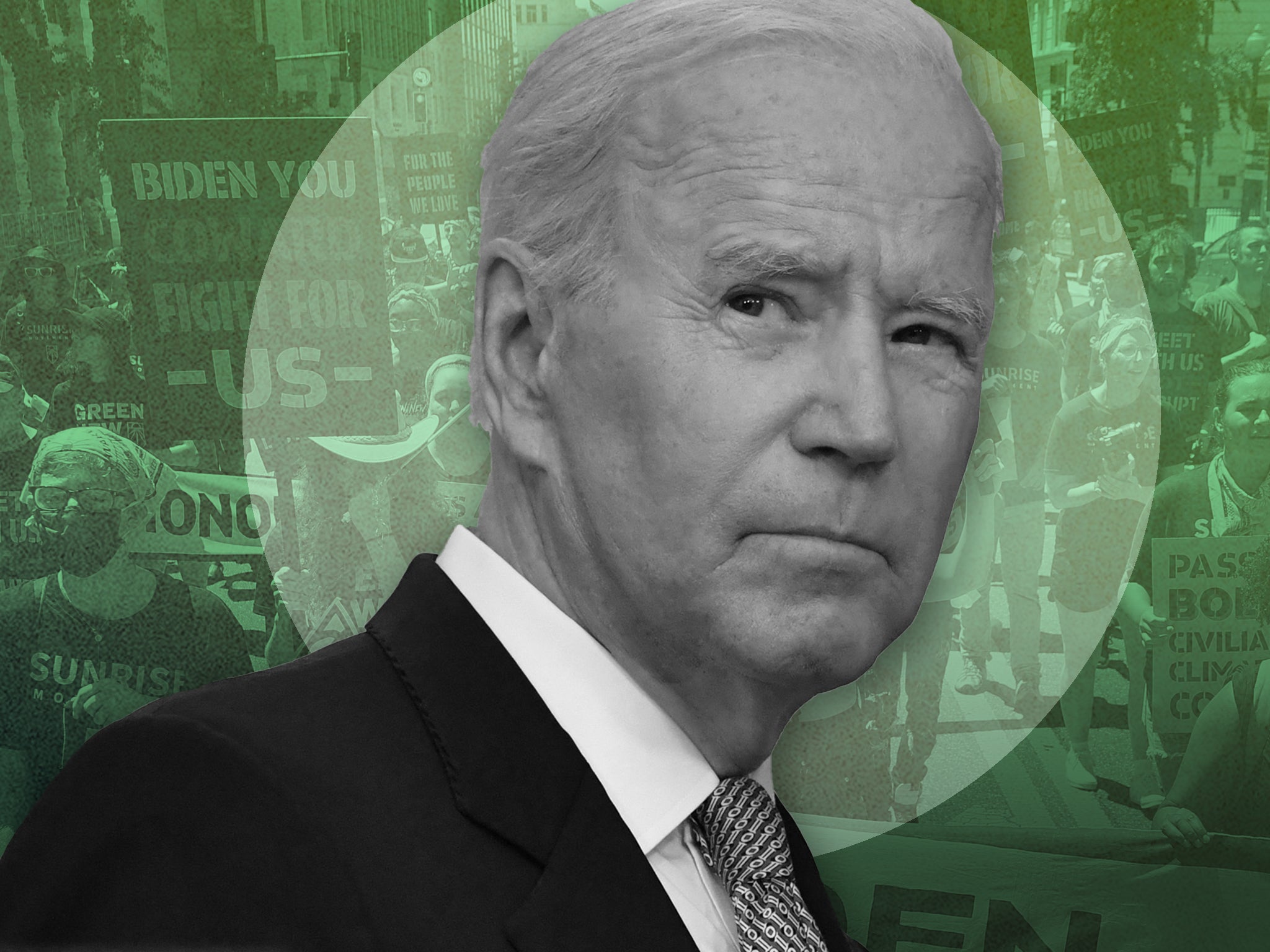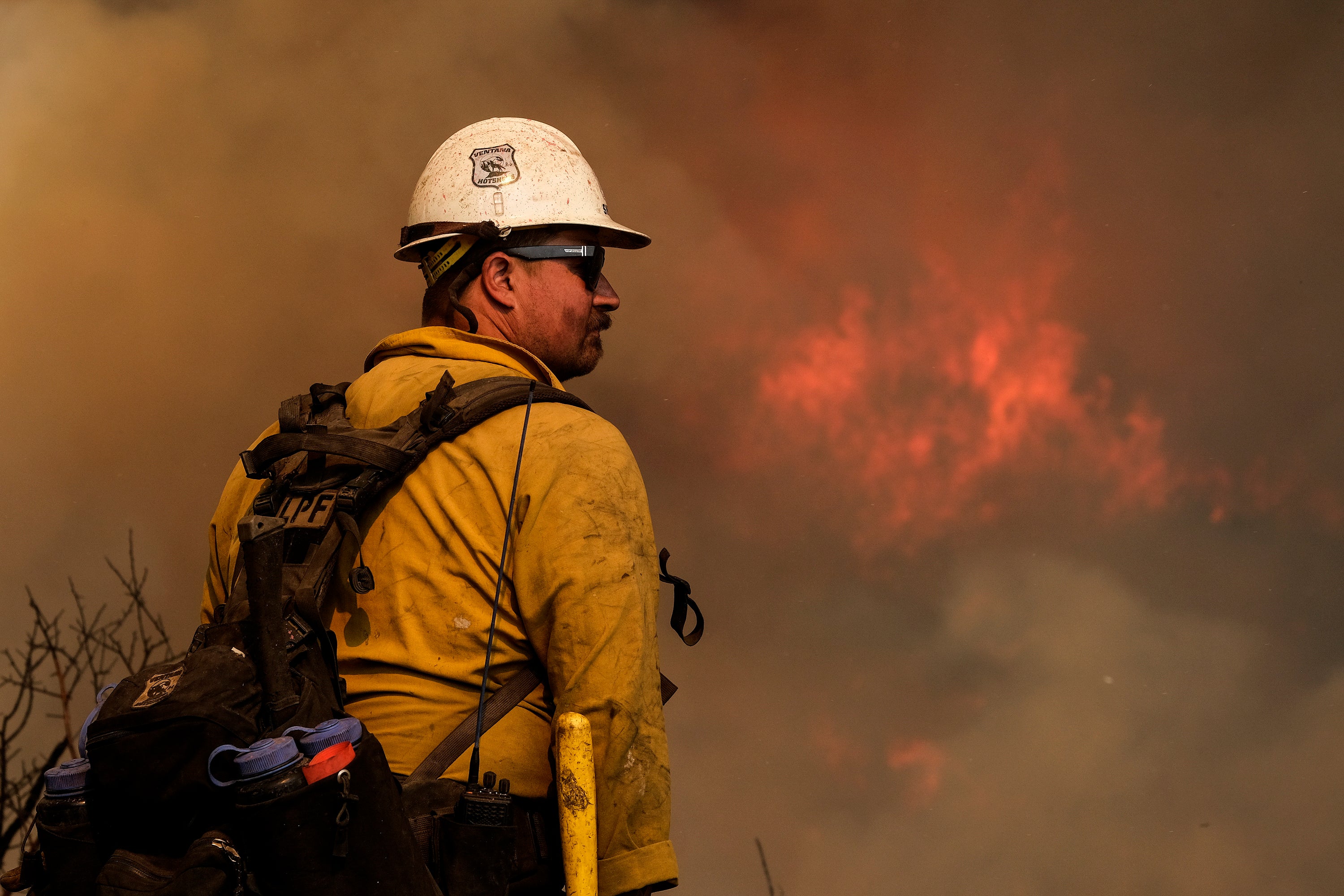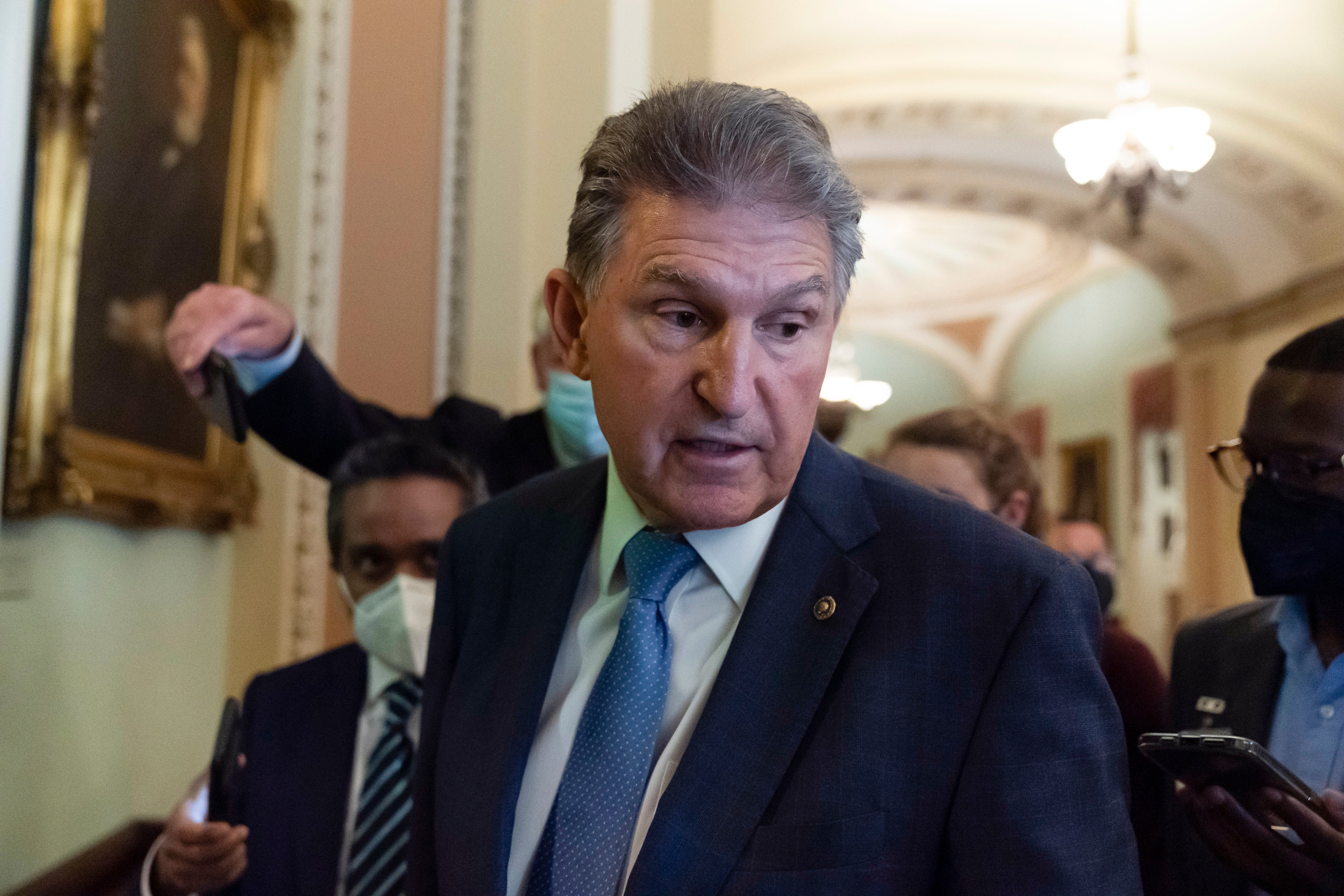Has Joe Biden lost his climate credibility?
The president planned to arrive at the Cop26 summit with strong action to tackle global heating already in place at home. Instead his green image teeters on a knife-edge. Louise Boyle looks at what’s gone wrong


In less than two weeks, Air Force One will take off for Scotland, ferrying Joe Biden and his entourage to the Cop26 summit in Glasgow. It is a major test for the US president, who won last November’s election partly on the back of his bold vision to chart a greener future for America amid ever worsening climate extremes.
In stark contrast to the inaction and outright denial of Donald Trump, the message has been that America is “back” on climate. Mr Biden rejoined the Paris Agreement to curb global temperature rise that had been abandoned by his predecessor; held a virtual climate summit for world leaders at the White House on Earth Day; installed an army of climate experts across government agencies; and dispatched special envoy John Kerry on a world tour to drum up ambition for slashing planet-heating emissions.
The strategy has been to prove to the world that America, historically the planet’s largest polluter, can once again be trusted to play its part in tackling the global crisis.
At home, Mr Biden had laid out an ambitious agenda to drive down emissions on a more urgent timeline, and shift America’s reliance on fossil fuels to clean alternatives in a way that would outlast his administration.
However, the president’s best-laid plans to arrive in Glasgow burnished by glowing domestic climate credentials now teeter on a knife-edge.
As of Wednesday, the Democrats’ $3.5 trillion (£2.5 trillion) budget reconciliation package to tackle climate issues – as well as boosting child-care provisions and healthcare – was being hammered down to a more modest $2 trillion in order to satisfy the few party moderates needed to pass the legislation on razor-thin margins in the Senate.

One element likely to be dropped is a clean energy plan that was integral to Mr Biden’s promise of eliminating 50 per cent of US emissions from 2005 levels by 2030, and transitioning the power grid – the second largest source of domestic emissions after transport – to run on 100 per cent clean energy by 2035.
It has left staffers scrambling to work out whether other proposals in the package can make up the gap.
The diminished climate measures also raise questions about how Mr Biden and his delegates will be able to convince other major polluters – among them China, Russia, Brazil and Australia – to take more drastic action on their own national carbon footprints at Cop26.
At the summit, countries must commit to dramatically improve carbon cuts to keep global temperature rise from pre-industrial levels to an increasingly ambitious 1.5C, or “well below” 2C, as set out by the 2015 Paris Agreement. The world is on track for temperature rise in excess of 3C this century.
Mr Biden appears acutely aware of the implications. Congressman Ro Khanna, of California, one of the lawmakers who was at the White House on Tuesday, said that the president urged them to “get something done” ahead of the Glasgow summit.
“He looked people in the eye and said, ‘The prestige of the United States is on the line,’” Rep. Khanna posted on his Twitter account. The White House did not respond to requests for comment.
White House press secretary Jen Psaki said on Tuesday that Democrats were now in “broad agreement” and that the package could be finalised in the coming days.
Failing to aggressively tackle the climate crisis will have implications for the US not only on the world stage but also at home.
This year the country has suffered intense, climate-driven extremes that have cost billions of dollars in damage: from an unprecedented wildfire season in the West, deadly heatwaves across states, and powerful hurricanes rolling in from the south which left dozens dead and entire communities destroyed.

“I can’t support a reconciliation bill that doesn’t have a strong climate title,” Democratic Senator Chris Murphy, of Connecticut, told The Independent. “And I think there’s a lot of folks who share that belief in the Senate.
“I think it’s important for us to have a framework agreement on climate in time for Glasgow. Very important.”
The Clean Electricity Performance Program (CEPP) would have incentivised electricity providers to switch to clean power sources like wind and solar, and penalised those who remained wedded to fossil fuels. But it looks set to be culled from the spending plan due to opposition from Senator Joe Manchin, the fossil fuel industry-backed Democrat from coal-producing West Virginia.
Climate activist Jamie Henn, director of Fossil Free Media, told The Independent: “President Biden is going to show up to Glasgow empty-handed if he keeps letting Senator Manchin dictate his climate agenda, rather than using the sweeping executive authority he has as president to act on climate and fossil fuels.”
Senator Manchin’s office did not respond to a request for comment from The Independent on how diminished measures to tackle the climate crisis might impact the country’s negotiating power at Cop26.
Some Democrats expressed confidence that the US retained a strong position coming to Glasgow despite the setbacks in Congress.
“I think we’re going have a strong hand, and we have a lot of different things we’re doing on climate including what’s in budget reconciliation,” Maryland senator Ben Cardin told The Independent.
“Even without budget reconciliation, the actions taken by the administration, what’s in the bipartisan bill, we have a strong commitment on climate.”
Massachusetts senator Ed Markey, who introduced the Green New Deal with New York congresswoman Alexandria Ocasio-Cortez, said it was essential that emissions reductions, jobs and justice remained at the core of the congressional deal.
“I would like for the Congress to work to find as many effective mechanisms as we can to insert into the legislation, to be tools in order to meet those reductions,” Senator Markey told The Independent.
“You can’t negotiate with wildfires or negotiate with hurricanes... with droughts. You have to find a way to reach this goal and we will do so.”
Climate proposals still on the table include a roughly $500bn package that includes tax breaks for energy companies that hit emission-reduction targets, and tax credits for Americans who buy electric vehicles.
A report on Wednesday from the UN Environment Program revealed global fossil fuel production needs to be sliced by more than half to keep global heating from rising to dangerous levels. It found governments were still slated to extract twice as much oil, gas and coal in 2030 than would be consistent with the Paris goals.
Environmentalists told The Independent that, while disappointing, the cuts to Mr Biden’s sweeping climate plan were not unforeseeable.

“We can all vote count, and Joe Manchin is Joe Manchin. He definitely does not want to see coal and gas jobs disappear from West Virginia,” said Jean Su, director of the Energy Justice Program and senior attorney at Centre for Biological Diversity.
However, all was not lost for US credibility ahead of Cop26, she said, pointing to a “climate plan B” that groups including CBD have pushed for Mr Biden to take since he entered the White House.
“The president has an immense amount of executive powers that Congress has endowed him with over the last four decades,” Ms Su said. “We absolutely need to push in Congress – and we need the president to use the powers that Congress gave him to act boldly on climate. We need all the tools in our toolbox at the same time.”
By deploying his executive powers, environmentalists say, he could prove America’s mettle on climate – and fulfil one of his campaign promises: stopping fossil fuel leasing and drilling on public lands.
Mr Henn noted how Barack Obama rejected the Keystone XL pipeline just two weeks before the consequential Paris climate summit in 2015.
“Biden could wake up tomorrow and with a stroke of his pen stop Line 3, Line 5, the Mountain Valley Pipeline, and other major fossil fuel projects,” he said. “By lunch, he could declare a climate emergency, stop fossil fuel exports, and put his agencies to work on a just transition to 100 per cent renewable energy.
“If Biden is serious about this being a ‘code red’ emergency, then he needs to start using the awesome powers of the presidency to address it. Congressional action matters, but we were promised an ‘all-government’ approach on climate and so far, the Biden team hasn’t delivered.”
Additional reporting by Eric Garcia
Join our commenting forum
Join thought-provoking conversations, follow other Independent readers and see their replies
Comments
Bookmark popover
Removed from bookmarks